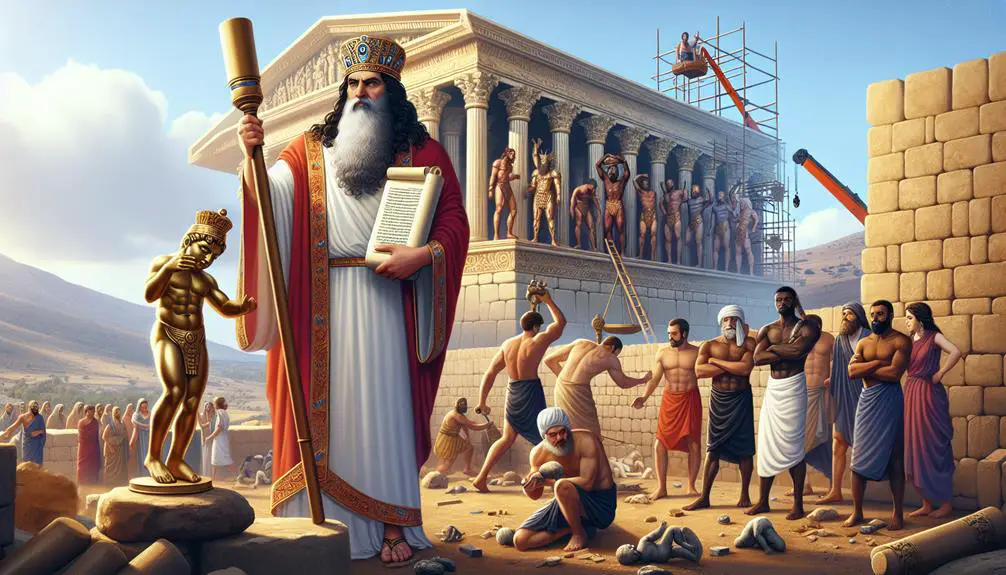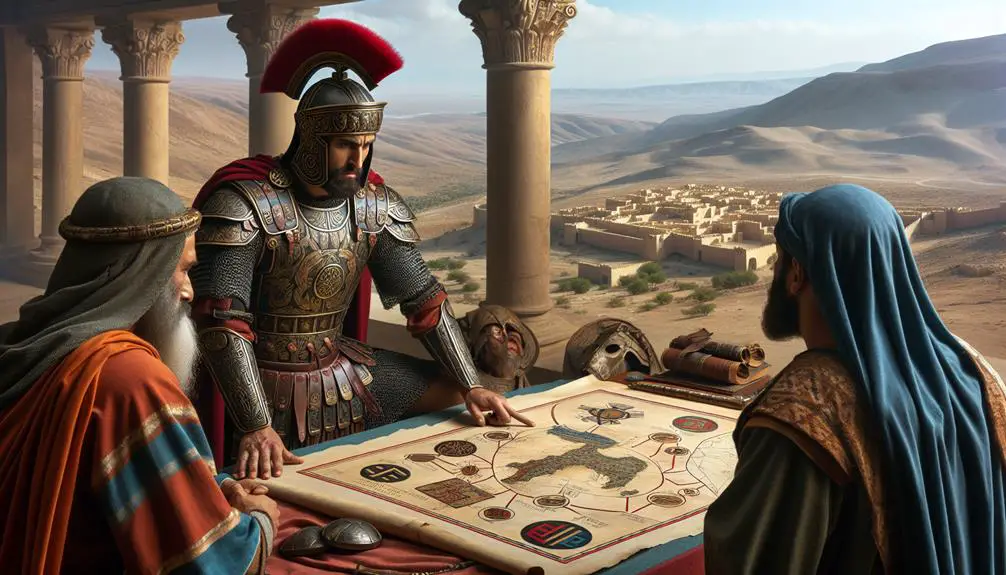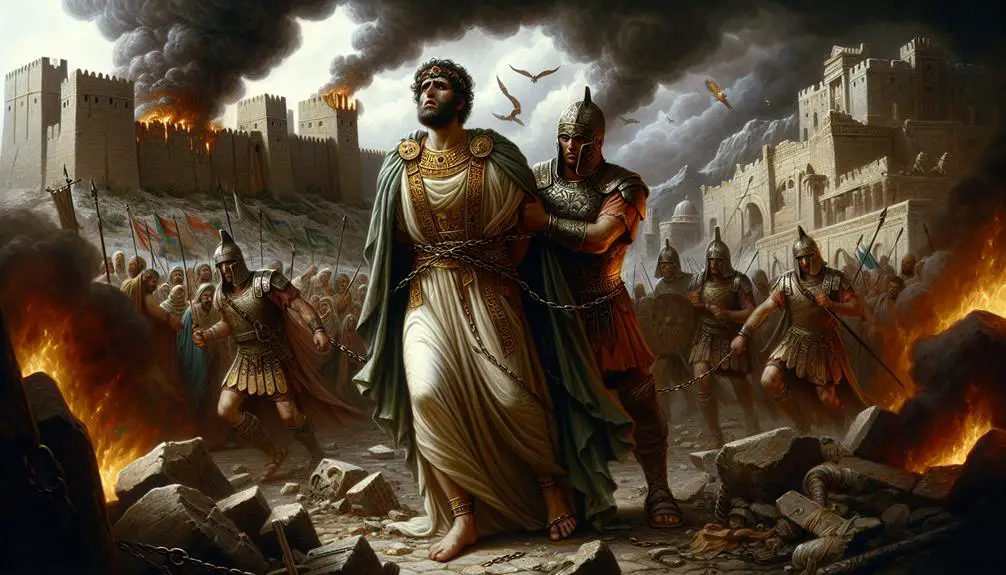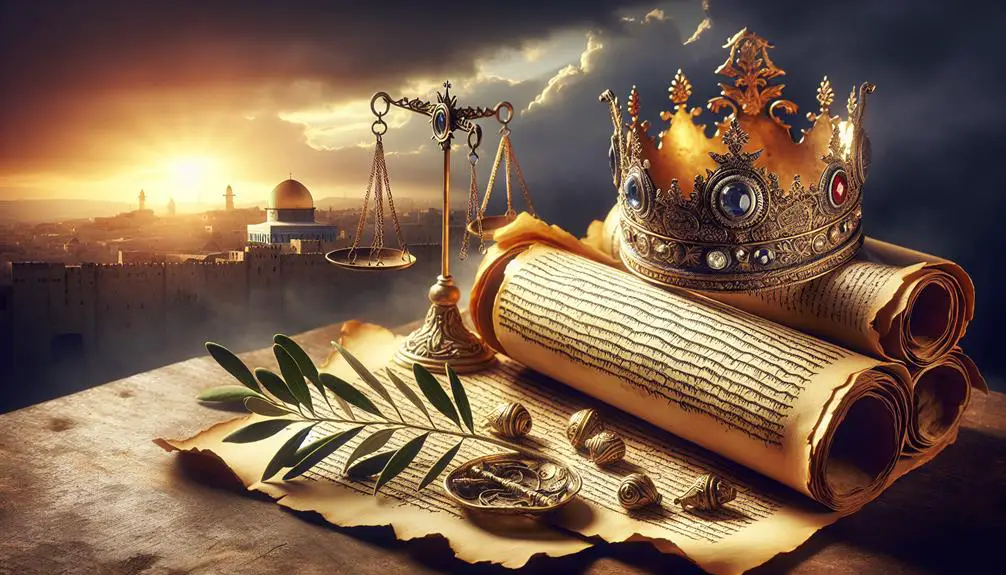King Amaziah's biblical tale unfolds with divine quests and dire missteps, beckoning a closer look into his dramatic reign and spiritual downfall.

King Amaziah in the Bible
King Amaziah's story in the Bible is so filled with drama and intrigue, it could easily rival any modern-day blockbuster. You'll find his tale, woven through the pages of 2 Chronicles and 2 Kings, captures not just his reign and religious reforms, but also his military endeavors and eventual downfall.
His journey from a ruler who sought to follow God's commands to one who strayed into idolatry is a rollercoaster of faith, power, and consequences. By exploring his legacy, you'll uncover insights into the complex relationship between divine guidance and human decision-making, leaving you pondering where wisdom truly lies in balancing the two.
Key Takeaways
- Amaziah's reign was marked by efforts to restore religious practices and temple worship in Judah.
- Strategic military campaigns under Amaziah aimed to strengthen Judah's sovereignty and stability.
- His downfall was precipitated by ignoring prophetic counsel and forming detrimental foreign alliances.
- Amaziah's legacy is a complex mix of religious reforms and cautionary tales about leadership failures.
Early Life and Ascension

In analyzing the early life and ascension of King Amaziah, one finds that, following the assassination of his father King Joash, Amaziah ascended to the throne of Judah at the age of twenty-five, marking a pivotal moment in the Judaic monarchy. This transition underscores the significant impact of parental influence and royal lineage on Amaziah's path to kingship.
Raised in the shadow of a king, Amaziah's upbringing was undoubtedly shaped by the expectations and responsibilities inherent to his royal lineage. His father's reign, characterized by a blend of achievements and failures, provided a complex legacy for Amaziah to inherit.
The influence of his father's rule can't be overstated. It prepared Amaziah for the challenges of governance and the intricacies of political maneuvering in a tumultuous period. Moreover, the royal lineage bestowed upon Amaziah not only a claim to the throne but also a connection to a dynasty that traced its roots back to King David.
This lineage was a source of both legitimacy and burden, imbuing Amaziah's ascension with historical significance and setting the stage for his forthcoming reign and the challenges it would entail.
Reign and Religious Reforms

Throughout his reign, King Amaziah initiated significant religious reforms, often challenging prevailing practices to realign Judah's worship practices more closely with their ancestral traditions. His efforts to combat idolatry and restore the temple underscored a deeper commitment to purifying the nation's religious life.
- Temple Restoration: Amaziah's dedication to repairing and purifying the temple was a cornerstone of his reign. This act wasn't merely about physical restoration but symbolized a return to the religious purity and dedication of their ancestors.
- Elimination of Idol Worship: He took bold steps to eradicate idolatry, recognizing it as a threat to the spiritual and moral fabric of Judah. This included the removal of idols and altars that had proliferated throughout the land.
- Reinstitution of Levitical Priests: Reaffirming the Levitical priests' authority ensured that worship and religious activities were conducted according to Mosaic Law, which helped to centralize religious practices and education around the temple.
- Promotion of Religious Festivals: By promoting and possibly restoring religious festivals, Amaziah aimed to foster a sense of community and religious identity among the people of Judah, reinforcing the importance of their traditions and beliefs.
These reforms were critical in addressing the spiritual decline and idolatry issues, setting a foundation for religious revival in Judah.
Military Campaigns

King Amaziah's military campaigns marked a critical phase of his reign, reflecting both his strategic acumen and the challenges he faced in expanding and defending Judah's borders. His approach to warfare wasn't merely reactionary but was characterized by meticulous planning and an understanding of the broader geopolitical landscape. This included recognizing the importance of battle strategies that could adapt to varied scenarios and the need to sometimes form or dismantle enemy alliances based on Judah's strategic interests.
Amaziah's initiatives to strengthen his army, as evident from the recruitment and organization of a formidable force, showcased his commitment to securing Judah's sovereignty. However, his military endeavors weren't without their complexities. The engagement with enemy states and the decision-making involved in forming alliances or confronting adversaries underscored the intricate balance of diplomacy and military strategy.
Analyzing Amaziah's campaigns reveals a ruler who wasn't only concerned with immediate threats but also with the long-term stability of his kingdom. His actions, whether in bolstering his military capabilities or navigating the treacherous waters of regional politics, were indicative of a leader striving to protect and expand his domain amidst a volatile regional context.
Downfall and Captivity

Despite his strategic prowess in military campaigns, Amaziah's reign ultimately met its downfall, marked by his captivity and the diminishing power of Judah. This period in his rule illustrates the consequences of neglecting prophetic warnings and relying on foreign alliances that compromised the sovereignty and spiritual integrity of the kingdom.
Several key factors contributed to Amaziah's downfall:
- Neglect of Prophetic Warnings: Amaziah ignored the divine counsel provided through prophets, leading to decisions that weren't aligned with the will of God.
- Unwise Foreign Alliances: Seeking military strength, he formed alliances with foreign powers, which ultimately backfired, exposing Judah to greater threats.
- Spiritual Infidelity: His actions reflected a departure from faithfulness to God, including the incorporation of foreign deities into worship practices.
- Internal Revolt: Discontent within his own ranks led to a weakening of his rule, culminating in his capture and the looting of Jerusalem.
Amaziah's story serves as a cautionary tale about the dangers of forsaking divine guidance for political and military expedience. It underscores the importance of spiritual integrity and the peril of ignoring prophetic voices in the pursuit of geopolitical advantage.
Legacy and Interpretation

Amaziah's reign, while marked by significant military campaigns, leaves a complex legacy characterized by his failure to heed divine guidance, ultimately influencing interpretations of his rule in biblical scholarship. This aspect of his kingship invites modern parallels, especially in discussions about the importance of spiritual wisdom over political or military prowess. Scholars often debate the consequences of his actions within the broader narrative of Israelite monarchs, suggesting that his story serves as a cautionary tale against the neglect of divine counsel.
Your examination of Amaziah's legacy reveals a multifaceted character whose decisions continue to spark theological debates. His initial obedience and later defiance of prophetic guidance underscore a pivotal theme in biblical literature: the peril of forsaking divine wisdom. This narrative thread resonates in contemporary discussions about leadership and morality, offering insight into the timeless struggle between human ambition and spiritual allegiance.
Frequently Asked Questions
How Does King Amaziah's Approach to Justice Compare With Contemporary Leaders in the Ancient Near East?
You're looking at how a leader's approach to justice compares with his contemporaries in the ancient Near East, focusing on judicial reforms and leadership style. Analytically, you'd note that this leader, unlike others, may have implemented reforms aimed at ensuring fairness and accountability.
This approach contrasts with many of his peers, who perhaps relied more on authoritarian methods. His leadership style, emphasizing justice and reform, sets a distinct example in a historical context.
What Psychological Analyses Have Been Conducted on King Amaziah's Decision-Making Processes During His Reign?
You're diving into decision psychology and leadership styles without referencing King Amaziah explicitly. Scholars have examined historical figures' decision-making, seeking patterns that reveal underlying psychological principles.
They analyze leaders' choices, stress responses, and risk-taking behaviors to understand their leadership styles. This approach sheds light on the complexity of ancient rulers' decision-making processes, offering insights into how power, personality, and external pressures intersected in shaping their reigns.
Are There Any Archaeological Findings That Directly Link to King Amaziah's Construction Projects or Royal Decrees Outside the Biblical Narrative?
Diving into the past, you're seeking treasures buried beneath sands of time, specifically Amaziah's inscriptions or remnants from his military campaigns.
Unfortunately, direct archaeological evidence linking to his construction projects or royal decrees, outside the biblical narrative, remains elusive. While historical digs have unearthed artifacts from the era, none have been definitively attributed to Amaziah's reign.
This gap in evidence leaves his architectural and governmental legacy largely undocumented in the archaeological record.
How Has King Amaziah's Story Been Depicted in Modern Media, Such as Films, Literature, or Art, and What Creative Liberties Are Typically Taken?
You'll find that King Amaziah's story isn't widely explored in modern media. However, when it is, cinematic adaptations and novel portrayals often take creative liberties, focusing on dramatizing his reign and conflicts.
These adaptations might embellish or reinterpret historical events for narrative impact. Scholars analyze these portrayals to understand how ancient stories are reshaped for contemporary audiences, examining the balance between historical accuracy and artistic interpretation in these retellings.
In What Ways Have Different Jewish and Christian Denominations Interpreted King Amaziah's Reign and Actions Differently?
When you delve into religious symbolism and denominational perspectives, you'll find interpretations of reigns and actions can widely vary.
For instance, Jewish and Christian denominations often see the same events through different lenses, highlighting unique aspects that resonate with their beliefs.
These perspectives can emphasize moral lessons or divine judgments, showing how one narrative can unfold in numerous ways depending on the religious context and the values it upholds.
Conclusion
Conclusively, King Amaziah's reign, characterized by significant religious reforms and military campaigns, epitomizes the complex nature of biblical leadership. His tenure, lasting 29 years, underscores the turbulent period of Judah's monarchy.
Notably, Amaziah's actions, particularly his defeat at Beth-shemesh, highlight the critical interplay between leadership decisions and national fortunes.
Statistically, his reign is among the longer ones for Judean kings, suggesting a degree of stability or fortitude.
Analytically, Amaziah's story invites reflection on the enduring impact of leadership choices on a nation's trajectory.



Sign up